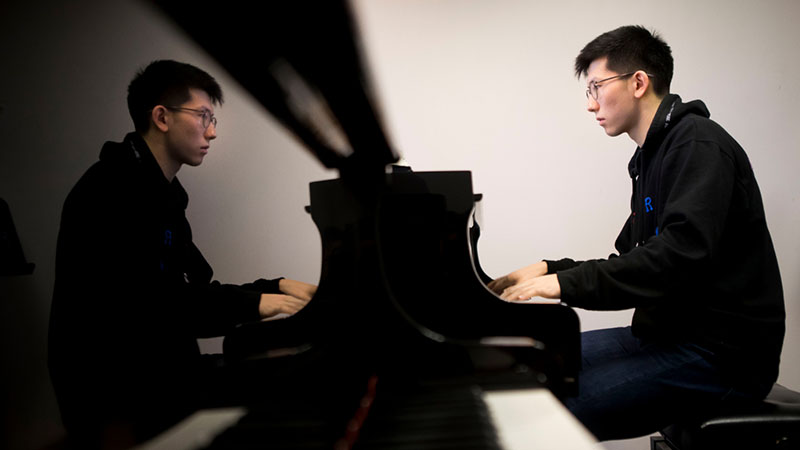
Prescreening & Audition Repertoire Requirements
All applicants must complete a prescreening video according to their program (instrument, voice, composition or jazz). Prescreening requirements are the same regardless of your specific major of interest (with the exception of jazz). For example: All voice applicants will follow the vocal requirements below, no matter what they plan to major in (Music Education, Performance, Integrated Studies or the Musical Arts degree). Once the admissions process is complete, admitted students will notify us of their intended specific major. You can learn more about these majors here. Jazz applicants should follow the specific jazz requirements below for prescreening and audition on their primary instrument or voice.
All applicants should feel free to reach out to Blair Admissions with audition repertoire questions.
Woodwinds
Brass
Strings
Piano
- Major and harmonic minor scales, four octaves (audition only)
- Prelude (prescreening only) and fugue (audition only) from Bach's Well-Tempered Clavier or similar contrapuntal Baroque work
- An allegro movement from a sonata by Haydn, Mozart (excluding K. 545), Beethoven (excluding Op. 49), or a similar work from the classical period (prescreening and audition)
- A major Romantic or Impressionist work (prescreening and audition)
- A major work by a 20th or 21st century composer (audition only)
- Sight-reading (audition only)
Percussion
- Concert snare drum solo or étude (prescreening and audition)
- Four-mallet marimba solo or étude (prescreening and audition)
- Timpani solo or étude (prescreening and audition)
- Traditional rudimental snare drum solo or étude (audition only)
- Two-mallet keyboard solo, transcription or étude (audition only)
- Demonstrate the ability to recognize, sing and tune pitches and intervals on timpani (audition only)
- Sight-reading on all percussion instruments listed above (audition only)
Harp
- One movement of a concerto by Handel, Mozart or Dittersdorf, or a similar work (prescreening and audition)
- Two contrasting solo pieces from different periods (prescreening and audition)
Voice
- A 20th or 21st century British, American or Canadian art song (in English), memorized (prescreening and audition)
- A foreign language art song, memorized (prescreening and audition)
- An additional art song, or an opera, operetta or oratorio aria, in any language, memorized (prescreening and audition)
- Monologue, memorized (for prescreen only), chosen from these four provided options.
Please be prepared to sight-read a vocal line at the piano, and complete sight-singing (for audition only.) In addition to the requirements listed above, Voice applicants are encouraged to share any background and experience with instrumental study, as applicable, on their Music Resume (private instruction, ensembles, etc.)
A change in repertoire for the audition must follow guidelines above. Please contact Blair Admissions with any questions.
Composition
- A portfolio of three original scores and corresponding recordings. At least one live recording is preferred, but not mandated. (prescreening only)
- A prescreening video showcasing proficiency on your primary instrument or voice. You may select any piece from your current repertoire. (prescreening only)
- Record a short video of yourself (no more than three minutes, please) describing, in musical terms, the goal(s) of one of the pieces you submitted and how you accomplished those goals. (prescreening only) For instance:
- What particular techniques or (perhaps new) approaches did you try?
- What difficulties did you encounter?
- What did you learn from this piece and the process that lead to it?
- Composition applicants who pass prescreening will receive an invitation to interview with the Composition faculty. This is the "audition" round for Composition applicants. Applicants who are invited to interview should bring the portfolio they submitted for prescreening and any other in-progress work.
Jazz
Applicants interested in jazz studies should prepare the following for their primary instrument or voice. The following areas are eligible for application to a major in Jazz Studies: Voice, Saxophone, Trumpet, Trombone, Guitar, Piano, Bass, and Drum set.
- Jazz Drum Set Requirements
- All other instruments and voices select three tunes from different categories below, playing the melody and improvising over the form. Applicants are required to perform repertoire from memory for prescreening and audition. Instrumentalists are to perform "Tall and Lanky" as one of their three pieces.
- Required for all instrumentalists: "Tall and Lanky" Click here to download a lead sheet or backing track for this piece.
- Blues: "Billie's Bounce," "Footprints," "Blues for Alice"
- Great American Songbook: "Like Someone in Love," "A Foggy Day," "I'm Beginning to See the Light," "On a Clear Day," "There Will Never Be Another You"
- Ballad: "Nearness of You," "In the Wee Small Hours of the Morning," "Darn That Dream," "Skylark," "My Romance"
- Latin/Straight: "Wave," "Tristeza," "Corcovado (Quiet Nights)," "Mas Que Nada," "Like A Lover (O Cantador)"
- Rhythm Section instruments must demonstrate ability to play diverse styles and grooves. (audition only)
- An additional tune from a different category (from the list above) not included in prescreening selections (audition only)
- Sight-reading (audition only)